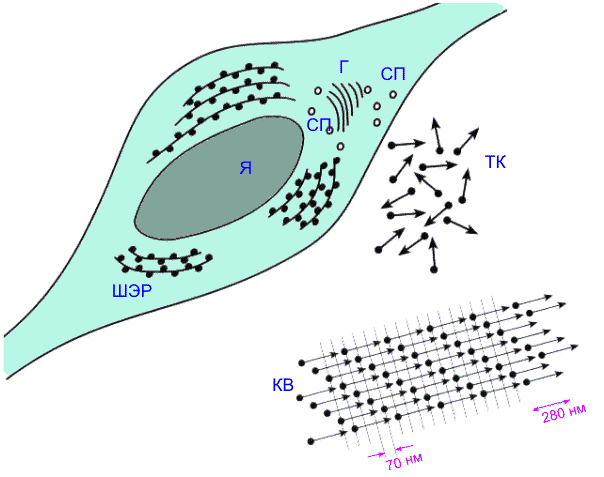Gene: [12q241/PAH] phenylalanine hydroxylase; phenylketonuria (phenylalanine hydroxylase deficiency);
GEN | The gene length is 96 kb. Exons: 13; introns: 12. The mature transcript is 2.4 kb in length. Phenylalanine hydroxylase is a homodimer with the MM of subunit 51.672 kD (451 amino acids)." |
FUN | [1] Phenylalanine
hydroxylase system includes three major components: phenylalanine
hydroxylase itself (PAH); dihydropteridine reductase (GEM:04p153/QDPR), and tetrahydrobiopterin (BH4,
cofactor). [2] PAH is an iron-containing tissue-specific liver enzyme catalyzing the linked oxidation reactions: Phe --> Tyr and BH4 --> quinoid form of dihydrobiopterin; the latter is reduced into tetrahydro-BH4 by the correspondent reductase (QDPR) in the presence of NADH. [3] BH4 synthesis includes four stages: (1) GTP-cyclohydrolase: GTP --> dihydroneopterin triphosphate (NPTP); (2) 6-pyruvoyltetrahydropterin synthase ((PVHPS): NPTP --> 6-pyruvoyltetrahydropterin; (3) and (4) are under investigation now, sepiapterin reductase is involved in reactions." |
FAG | Aromatic amino acid (Tyr, Trp, Phe) hydroxylase genes are components of a multigene family and are located in similar chromosomes, 12q (this gene) and 11p (GEM:11p155/TH; GEM:11p1/TRPH)." |
FOG | Mode of inheritance is autosomal recessive. |
HET | [1] The loss of
function of each of three PAH system components leads to progressive mental
retardation early in life, along with development of neurological symptoms.
"Classic" (severe) phenylketonuria is linked to PAH deficiency and atypical
forms of phenylketonuria (hyperphenylalanemias) are linked to QDPR or BH4
deficiencies. The latter case has at least two forms, associated with
genetic disruptions of the 1st and 2nd stages of BH4 biosynthesis - GTPCH
and PVHPS deficiencies. [2] "Classic" phenylketonuria was described by A.Folling in 1934. Atypical phenylketonurias (GTPCH and PVHPS deficiencies) were described by S.Kaufman in 1975-78 and in some other sources." |
PRO | Probe PDL32B identigies PAH-linked RFLP D12S7. |
POL | RFLPs for 8 restriction enzymes are revealed (sample of 132 chromosomes, Danish origin). Three RFLPs are located within 22 kb region at 5'-end of the gene: BGLII (+ allele=1.7 kb, frequency 0.226), PVUII/a (+/6.0/0.774), PVUII/b (+/9.1/0.105) - and five more within 31 kb region at 3'-end of the gene: ECORI (+/11.0/0.606), MSPI (+/19.0/0.545), XMNI (+/6.5/0.455), HINDIII (+/4.0/0.363), ECORV (+/25.0/0.499). The intervening 43 kb between these two clusters do not contain any RFLP. HindIII RFLP is due to 200 bp insertion/deletion (with GC sticky ends). Two haplotypes, the 2nd (-+--+-++, according to the above RFLPs) and the 3d (-+-+-+--) associate with PAH phenylketonuria in 58% (20+38) cases, which is seven times more often than with normal allele (8% = 5+3). A mutant allele was found with the aid of the 3d haplotype. This allele has G->A transition in 5'-donor splice site (GT) of intron 12, that leads to deletion of exon 12 along with introns 11 and 12 during mRNA splicing." |
EAG | Human PAH forms syntenic group (chr 12) with PEPB (q21) and INFG (q24.1). Murine PEPB and INFG are also syntenic (Chr 10). Hybridization on chromosomes indeed localized murine PAH gene to 10C2-D1. The homology of these syntenic groups means that human and mouse ancestors diverged about 750 Myr ago." |
REF | POL "Chakraborty &: Hum Genet, 76, 40-46, 1987 PND "Daiger SP &: Lancet, 1, 229-231, 1986 MUT "DiLella AG &: Nature, 327, 333-336, 1987 MUT "DiLella AG &: Nature, 322, 799-803, 1986 MEB "Kaufman: Enzyme, 38, 286-295, 1987 CLO,SEQ "Kwok SC &: Biochemistry, 24, 556-561, 1985 EVO "Ledley FD &: CCG, 47, 125-126, 1988 POL "Lidsky AS &: AJHG, 37, 619-634, 1985a PND "Lidsky AS &: Lancet, 1, 549-551, 1985b LOC "Lidsky AS &: PNAS, 82, N18, 6221-6225, 1985c LOC "Lidsky AS &: AJHG, 36, 527-533, 1984 MUT "Marvit &: NAR, 15, 5613-5628, 1987 PRO "O'Connell P &: Genomics, 1, 93-102, 1987 PRO,MUT,POL,GEN,POG "Okano Y &: Genomics, 9, N1, 96-103, 1991 MUT,POG "Wang &: Somat Cell Mol Genet, 16, 85-89, 1990 MUT,POL,POG "Woo SLC: Biochemistry, 28, N1, 1-7, 1989 POL "Woo SLC: AJHG, 43, 781-783, 1988 CLO,PND,MGC "Woo SLC &: Nature, 306, 151-156, 1983 |
SWI | SWISSPROT: P00439 |
KEY | neu, mtbd |
CLA | coding, basic |
LOC | 12 q24.1 |
MIM | MIM: 261600 |
EZN | ENZYME: 1.14.16.1 |
